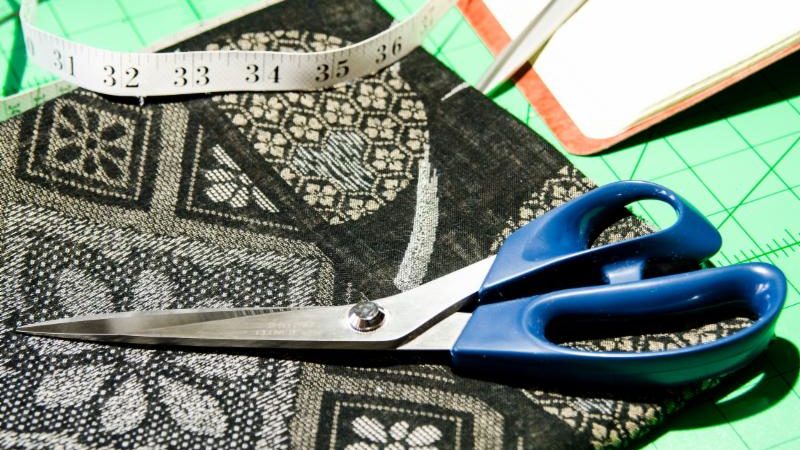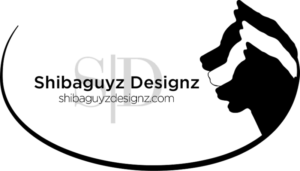SCISSORS VS. SHEARS: WHAT’S THE DIFFERENCE?

So, do you know the difference between scissors and shears? Yes, they are different, and for sewing, both have a place in your tool kit.
What distinguishes scissors from shears is the length of the blades and the shape of the handles. Scissors typically have blades that are 6″ long or shorter while shears usually have blades that are 7″ or longer.
The big difference is how you hold them which all comes down to the handles and how the handle allows you to hold the blades and maneuver them. Scissors have handles with holes that are shaped the same. With a handle like this, you can get one finger into one hole and your thumb into the other. This makes them good for cutting both vertically and horizontally but you only have as much cutting power as you can exert with one finger and your thumb. Shears, on the other hand, have a handle with one small hole for the thumb and another larger hole for two or more fingers. This irregular shape allows your hand to hold the blades at a slight angle to manage the cutting better on flat surfaces like tabletops. This makes for more precise cuts when cutting out pattern pieces or quilt block components and allows you to exert the strength of your entire hand for cutting. This is particularly important for cutting through heavier materials.
IT IS ALWAYS WISE TO INVEST IN HIGH QUALITY SCISSORS… AND MORE THAN ONE PAIR.
Regardless of what you are using them for, you will find that your scissors will remain sharp and accurate so long as you utilize one pair for cloth and fabric and a second pair for other crafting supplies. Most of you have heard, or yelled out, “PUT DOWN and slowly step away from my fabric scissors!” Keeping one or two (or six or seven in our case) of scissors devoted to one type of cutting will help keeping the blades razor sharp… making your craft cutting free from crying and swearing… because ain’t nobody got time for a dull pair of scissors!
Here are the big guns in our studio right now.
Clover Patchwork Scissors, Large – We have to say we love these! We refer to these as our Workhorse Shears or Table Top Shears… because that’s where they always are: on the top of the cutting table or hanging on the wall behind it. As the name indicates, these are large at 9 ½ inches and they have a nice big grip on the handles. A great set of shears like these with a little heft to them are essential for garment making and cutting multiple layers of fabric or heavier materials. And, if you work with fabrics that tend to slip and slide around, you are going to love the design of these blades. The micro serrations on the bottom blade holds fabric in place as they cut are SO GOOD for cutting slippery or delicate fabrics that can easily shift and move around when cutting.
 On a personal note, we like the size of these grips since we can get our big ol’ fingers in there without cramming them up. FINALLY! And Shannon particularly likes the grip on these for those days when his arthritis makes cutting not so much fun.
Clover Bordeaux Ultimate Shears, (200 mm) –These are another pair that live on our cutting table so they are always close at hand. They are lighter-weight shears and are perfect for large cuts of single layers of fabrics, paper, and crafting materials. These have a smooth blade that cuts cleanly from end to tip and the grips, although slightly smaller than the Large Patchwork Scissors, is still roomy enough for our fingers and feels good on those days when the arthritis is here for a visit. We go back and forth between these and the Large Patchwork Scissors depending on what needs cut on the table or… ya know… which pair one of us can reach across the other one to get to.

Patchwork Scissors –“The Goldilocks of scissors”… Bigger than the Patchwork Scissors – Small, and smaller than the Patchwork Scissors – Large, these are perfect as a catch all pair of scissors. Like their larger cousin, they have the bottom serrated blade and an angled grip. They are the perfect size for medium sized cuts, where mini scissors are too small and the shears are overkill… see… Goldilocks! We keep a set close when working on Boro projects for on-the-fly cleanup of patch edges. Keeping a set of these in your “junk drawer” (c’mon, we all have one somewhere) will ensure you can open everything from mail to boxes and those evil plastic wrapped packages that everything comes in these days. Seriously… these are just great, all-around scissors to have around for all kinds of crafts and projects. Oh yeah… they come with a hard sheath that keeps the sharp blade safely locked away until called upon and keeps them from flailing around in a project bag or sewing kit.

Bordeaux Ultimate Scissors, (170 mm)– Smaller and lighter, these make excellent companions to the larger scissors since they can get those close cuts where the Shears are just too big to manipulate with precision. These will easily become the go-to scissor that you use consistently. Notice, like true scissors, they have a straight blade that matches up with the handles and two mirror image holes for your fingers. They are, simply, classics. They can be used for a lot of different things but as long as you use them for similar materials every time, (i.e. fabric only or paper only) they will keep their blades sharp. Yes, we have two pair of these and one is, indeed, for fabric and the other is for paper. This is another FAB all-around scissor… you’re going to want more than one pair… just sayin’.

Patchwork Scissors, Small – At 5 ½ ” long, these sharp pointed scissors are a must for small cuts where precision is key like reverse applique or, as the name indicates, small patchwork projects. We use these in our portable sewing kits for hand pieced quilting and boro for cleaning up edges. If you do a lot of small handwork sewing and quilting, you need to have these by your side.

Bordeaux Ultimate Scissors, 130 AND Patchwork Scissors, Mini – At 5″ and 4.5″ respectively, we keep these in our crochet and knitting kits and in our travel sewing kits for yarn and thread snips. You won’t ever fumble with another pair of those nasty little hotel sewing kit scissors if you have these with you. For quick small cuts in confined areas either of these is a must. These both get an award for unexpected usability for cutting open those basted pockets in suit jackets. Oh yeah!
One slight difference in these two scissors is the finer taper of the Patchwork Scissors, Mini. The longer taper on these means there is a thinner cutting blade making them beyond PUHR-FEK-SHUN for trimming up the ends of your embroidery threads. You can lay them right down close to your work and target individual threads without cutting neighboring threads or cloth (cutting the loops from punch embroidery is a breeze with these).
Speaking again to manual dexterity, both of these have nice sized finger and thumb holes in the handles so you can actually have more control over the blades for finer work. In other words, you don’t have to hold them with the very tips of your fingers so they end up slipping off… ugh… Right?

Award of Merit: Although not technically scissors, we could not go without mentioning the Clover Kuroha Thread Clippers (item# 415). These little gems have a carbon steel blade and can be found in every crochet and knitting project bag and case, sewing basket, and sewing kit in the house. There are even a pair on either side of the couch (we have those wide flat arms on our couch) for us to use at any moment. They are really that useful! And, if you look at most photos of people who do Sashiko, these are the style of scissors you see on their work station. The best thing about them is that they are, a “snip” or “clip” style of cutter. This style of cutter features blades that are separated and you squeeze the handle to make your cuts. You don’t have to fidget with putting your fingers into a pair of scissors to make a cut… just grab and go and you’re back to work! From cutting yarn ends to quickly snipping threads we always have a pair of these ready for use!

|












